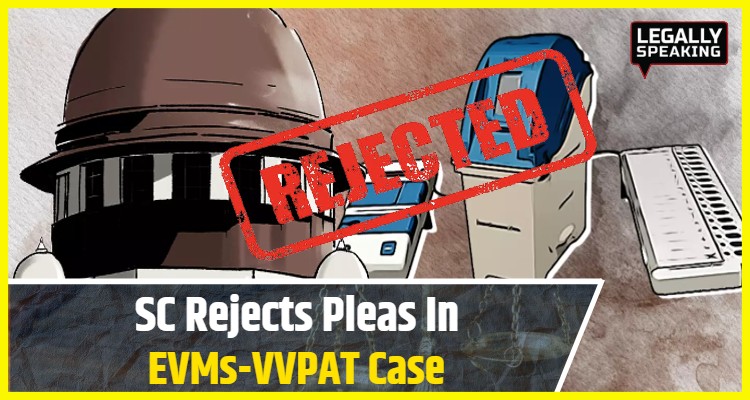
The Supreme Court on Friday has rejected a batch of pleas seeking complete cross-verification of votes cast using EVMs with Voter Verifiable Paper Audit Trail, or VVPAT.
A bench of Justices Sanjiv Khanna and Dipankar Datta pronounced the verdict.
BENCH VERDICT
Pronouncing the verdict, Justice Khanna stated, “We have given 2 directions. One direction is after the completion of symbol loading process, the Symbol Loading Unit should be sealed. The SLU should be stored at least for a period of 45 days. The burnt memory in the microcontroller EVM shall be checked by a team of engineers after the declaration of results on a request by candidates in serial number 2 & 3, such a request to be made within 7 days after the declaration of results. The expenses for the verification (of the program) to be borne by the candidates making the request, in case the EVM is found to be tampered, the expenses will be refunded.”
Justice Datta stated that blindly distrusting a system can lead to unwarranted suspicions.
Justice Khanna asked ECI to examine the suggestion for the electronic machine for vote counting the paper slips and whether along with the symbol there can be a bar code for each party.
“That on completion of the symbol loading process in the EVM undertaken on or after 01.05.2024, the symbol loading unit should be sealed and secured in containers.
The candidates and their representatives shall sign the seal. The sealed containers containing the SLUs shall be kept in the store rooms along with the EVMs at least for a span of 45 days post the declaration of results.
The burnt memory semi controller in 5% of the EVMs that is the Control Unit, Ballot Unit and the VVPAT per assembly constituency per parliamentary constituency shall be checked and verified by a team of engineers from the manufacturers of the EVM post the announcement of results on a written request by candidates 2 & 3.
However, with such request that’s to be made within 7 days of the result declaration. The actual cost to be borne by the candidate making the request. Expenses to be refunded in case the EVMs are found to be tampered.”
CASE HISTORY
Previously on Wednesday the top court stated it can’t, “control the elections” or issue directions simply because doubts have been raised about the efficacy of EVSs, as it reserved its judgement on the clutch of petitions, which also claimed the polling devices can be tinkered with to manipulate the results.
The court stated it can’t change the thought process of those doubting the advantages of polling machines & advocating going back to ballot papers.
Also, the bench took note of the answers to queries it posed to the Election Commission.
It sought answers from an official of the poll panel to 5 questions related to the functioning of EVMs, including whether the microcontrollers fitted in them are reprogrammable.
After a 2-day hearing, on April 18 the bench reserved its verdict on the pleas. However, the matter was listed again on Wednesday as the court wanted some clarifications from the EC.
NGO ‘Association for Democratic Reforms’, one of the petitioners, has sought reversal of the poll panel’s 2017 decision to replace the transparent glass on VVPAT machines with an opaque glass through which a voter can see the slip only when the light is on for 7 seconds. The petitioners have also sought the court’s direction to revert to the old system of ballot papers.
The 7-phase Lok Sabha polls began on April 19 and will conclude with the announcement of results on June 4.




